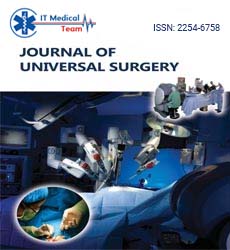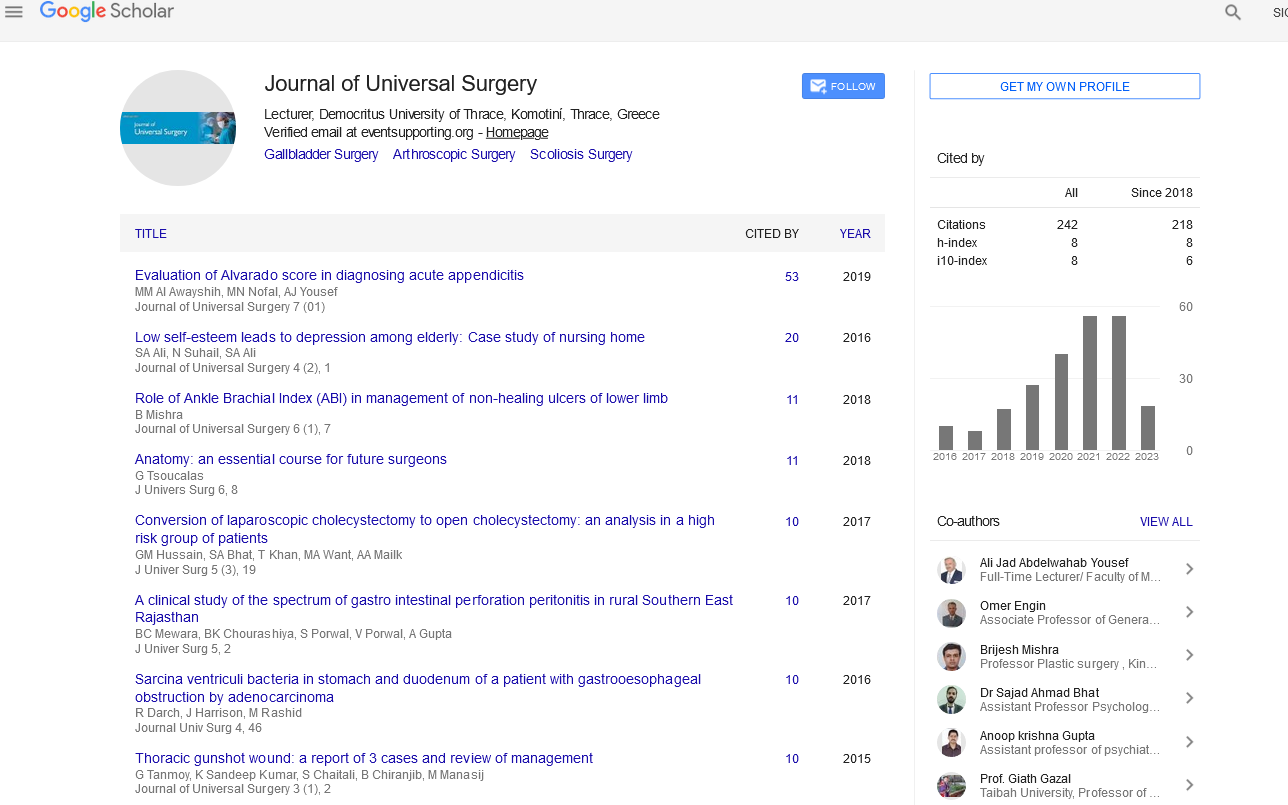Perspective - (2023) Volume 11, Issue 6
The evolution of outpatient surgery: A patient-centric approach to healthcare
Regalla Reposie*
Department of Outpatient, University of Otjinene, Omaheke, Namibia
*Correspondence:
Regalla Reposie, Department of Outpatient, University of Otjinene, Omaheke,
Namibia,
Email:
Received: 06-Nov-2023, Manuscript No. ipjus-23-14368;
Editor assigned: 09-Nov-2023, Pre QC No. P-14368;
Reviewed: 23-Nov-2023, QC No. Q-14368;
Revised: 11-Dec-2023, Manuscript No. R-14368;
Published:
19-Dec-2023
Introduction
In recent years, the landscape of healthcare has undergone
a paradigm shift, with a growing emphasis on patientcentered
care and cost-effective solutions. One significant
development that aligns with these principles is the surge in
popularity of outpatient surgery. Also known as ambulatory
or same-day surgery, outpatient surgery has transformed
the traditional hospital-centric model, offering patients a
more convenient, efficient, and personalized approach to
medical interventions.
Description
Defining outpatient surgery
Outpatient surgery refers to medical procedures that do not
require an overnight stay at the hospital. Patients undergo
surgery and are discharged on the same day, allowing them
to recover in the comfort of their homes. This approach
has gained widespread acceptance due to its numerous
advantages, including reduced healthcare costs, decreased
risk of hospital-acquired infections, and improved patient
satisfaction.
Advantages of outpatient surgery
Cost-effective: Outpatient surgery is often more costeffective
than traditional inpatient procedures. The reduced
need for overnight hospital stays translates to lower facility
fees and decreased overall healthcare expenses. Patients and
healthcare providers alike benefit from these cost savings,
contributing to a more sustainable and accessible healthcare
system.
Convenience for patients: One of the most significant
advantages of outpatient surgery is the convenience it
offers to patients. By eliminating the need for an extended
hospital stay, patients can return to the comfort of their
homes on the same day as the procedure. This not only
reduces disruption to their daily lives but also minimizes
the psychological stress associated with prolonged
hospitalization.
Quicker recovery: Outpatient surgery is often associated
with quicker recovery times compared to inpatient
procedures. Patients can recuperate in familiar surroundings,
surrounded by their support systems, which has been
shown to positively impact recovery. This accelerated
recovery contributes to improved overall patient outcomes.
Reduced infection risk: Hospitals are breeding grounds for
infections, and longer stays increase the risk of hospitalacquired
infections. Outpatient surgery minimizes this
risk, as patients spend significantly less time in healthcare
facilities. This not only protects patients but also contributes
to broader efforts to reduce the incidence of healthcareassociated
infections.
Enhanced patient experience: Outpatient surgery centers
are designed to prioritize patient comfort and satisfaction.
From streamlined check-in processes to personalized
attention from healthcare professionals, patients experience
a more focused and attentive approach to their care. This
emphasis on patient experience is a critical aspect of the
shift towards patient-centered healthcare.
Challenges and considerations: While outpatient surgery
offers numerous benefits, it is essential to acknowledge
and address potential challenges. For certain complex
procedures, patients may still require inpatient care.
Additionally, there is a need for robust pre-operative
assessments to ensure that patients are suitable candidates
for outpatient surgery. Careful patient selection, thorough
education, and effective communication between
healthcare providers and patients are crucial for the success
of outpatient procedures.
Technological advancements in outpatient surgery: The
integration of advanced technologies has played a pivotal
role in the evolution of outpatient surgery. Minimally
invasive techniques, such as laparoscopy and roboticassisted
surgery, have become standard practice in many
outpatient procedures. These technologies reduce surgical
trauma, enhance precision, and contribute to faster recovery
times, making them well-suited for outpatient settings.
Telehealth and outpatient surgery: The rise of telehealth
has further complemented the outpatient surgery model.
Preoperative consultations, follow-up appointments,
and postoperative care can now be conducted remotely,
minimizing the need for in-person visits. Telehealth not
only improves patient convenience but also facilitates
ongoing communication between patients and healthcare
providers, leading to more comprehensive and personalized
care.
The role of outpatient surgery in shaping the future of
healthcare: As healthcare systems evolve, outpatient surgery
is expected to play a more prominent role in shaping the
future of patient care. The emphasis on value-based care,
cost-effectiveness, and patient satisfaction aligns seamlessly
with the principles of outpatient surgery. Policymakers,
healthcare providers, and insurance companies are
increasingly recognizing the potential of outpatient surgery
to optimize resource utilization and enhance overall
healthcare quality.
Conclusion
Outpatient surgery represents a transformative shift
in the healthcare landscape, offering a patient-centric,
cost-effective, and efficient alternative to traditional
inpatient procedures. The benefits of outpatient surgery,
including reduced costs, enhanced convenience, and
improved patient outcomes, position it as a key player
in the future of healthcare delivery. As technology
continues to advance and healthcare systems adapt to
changing paradigms, outpatient surgery is likely to
become an even more integral component of
comprehensive and patient-centered medical care.





